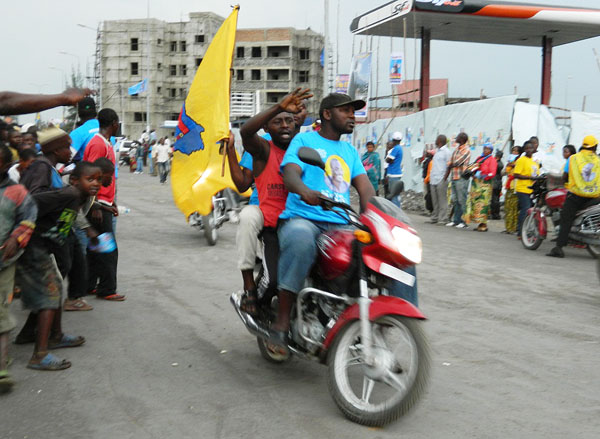
GOMA, Democratic Republic of Congo — The election scheduled for next Monday is only the second time that the Congolese will choose their leader by universal suffrage. As the voting date approaches, people are getting increasingly worried about what will happen after the election results are announced in early December. Will the candidates accept the outcome? Will their supporters? These questions are especially important for Congo’s restive East.
In conflict-prone North and South Kivu provinces, fear of a scenario in which Joseph Kabila is not reelected as president is growing. Rumors abound that without Kabila as the head of state, the Tutsi-based National Congress for the Defense of the People, or CNDP, might attempt secession and declare independence for the two Kivu provinces. The Rwanda-supported CNDP was previously the strongest armed group the government had to reckon with in North Kivu—that is, until early 2009, when the government signed a peace deal that integrated the rebel group into the national army and transformed it into a political party. Since then, the CNDP has been able to dominate Congo’s military structure in the East, where few units are loyal to the government, and to establish de facto control over most of North and South Kivu. Until forced out of mining sites as a result of the restructuring of the military this year, they controlled most of Kivus’ major mines and mineral routes.
It is widely believed that these concessions were given by Kabila to ensure the CNDP would not return to the bush to fight the government. But the CNDP could lose its privileged position in the Kivus if President Kabila is not elected again. Kabila’s main contender, Etienne Tshisekedi, has already claimed he would throw out all “Rwandans and their sympathizers.” He insinuated the current president was among them, and no one doubts the classification includes the CNDP as well.
The CNDP political party has endorsed Kabila’s candidacy. Military units mostly comprised of former CNDP have recently been coaxing people to vote for Kabila in various parts of North Kivu, according to Enough sources. This is in clear violation of Congo’s constitution (Article 188), which states that armed forces are apolitical and must serve the entire nation. Military units have been using convoys to distribute campaign material, including t-shirts and posters with prints of Kabila, in parts of Walikale territory and in several towns in Masisi (Kirolirwe, Kichanga, and Mweso), as Enough’s Fidel Bafilemba recently reported. In Walikale town, military units have also organized concerts where they handed out Kabila’s poster along with brand new 500-franc notes.
Among the Rwandaphone communities in Goma and the southern parts of North Kivu, like Masisi and Rutshuru, word-of-mouth support for Kabila has increased as well. Community leaders have been spreading fears that Kabila was the only candidate to safeguard Congolese citizenship of Rwandaphones. Local and national leaders have been using this threat over and over again since Congo’s independence in 1960. During the electoral registration process, Rwandaphone refugees in Rwanda, Burundi, and Uganda had similarly been talked into registering for a provisional ID card and casting their votes for the incumbent president.
While the CNDP as an institution is not necessarily behind this propaganda, they have a clear stake in the elections. Since they dominate the military in the East, a declaration of independence could lead to a breakout of full-out war between two military factions—the East against the rest. No doubt many Kivurians are afraid of such a scenario.
Photo: Kabila supporters piled on a motorbike in Goma (Enough/Fidel Bafilemba)

